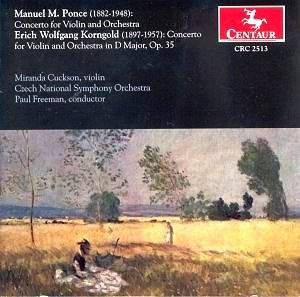These are two American violin concertos written
during wartime within two years of each other.
Ponce, Mexico's leading composer, allowing for
Revueltas and Chavez, dedicated this, his last major composition,
to Henryk Szeryng. But for Szeryng's exclusive championship this
is the sort of work that, in its indefatigable hoarse lyrical
energy, would have been a natural for Heifetz. It has no truck
with dodecaphony nor with neo-classical anaemia. It is just an
outright singer of a work which you can group with the Barber,
the Ivanovs and the Walton. It is romantic to a fault - a lovely
piece.
Miranda Cuckson is not abashed by the various
Szeryng recordings nor should she be for hers is a most attentive
and loving performance. In case you are wondering, Ponce does
not indulge in the percussion experiments of Revueltas or Chavez.
He had one world-wide hit in the popular song Estrellita
(which was recorded by Heifetz!). There is a reference to it in
the strings beneath the soloist's arabesques at the end of the
second movement. Interesting to note that this concerto was started
shortly after Ponce had completed his guitar concerto, Concierto
del Sur, for Segovia. Nationalist feeling is only really noticeable
in the finale.
While Ponce may have had to struggle with less
than world class standards in Mexico City, Korngold, a stranger
in a strange land, anxious to please and survive, had the pick
of world's greatest musicians in California. Many were, like him,
refugees from European pogroms. There are parallels in the Korngold
work with the Ponce. They both share an access to melodic fluency.
However in Korngold's case the concerto gives free rein to an
irresistible sentimentality - all schlagobers and coffee. I found
the starry in-your-face intimidating lushness of the Heifetz RCA
recording a positive turnoff at one time and turned my back on
the concerto. My interest was only ignited by Hoelscher's EMI
version (now Redline) and the Anima-Mathé Dorian recording.
Anima-Mathéís more objective approach reaps rewards and
presents the concerto without the choking tide of caramel. Cuckson
is no Huberman, Heifetz or Kulenkampff but she certainly plays
this work convincingly. In this she is aided by
the same orchestra that made such a superb job with Serebrier
of the JanŠček orchestral music (Reference Recordings).
I liked the Korngold more than my colleague Jonathan
Woolf. It will please the collector who buys it for the Ponce
and tries the disdained Korngold work. Cuckson really does make
a lyrically restrained job of the Romance and Paul Freeman's
orchestra accomplishes many caring touches especially in that
movement which plays out with vibraphone and a starry firmament
of violins. It hardly matters that the thematic material for this
work has been appropriated, presumably without contractual problems,
from Korngold's Warner Brothers' film scores.
Certainly worth hearing alongside Hoelscher (EMI Red
Line), Mintz (Universal DG), Perlman (EMI) and Anima-Mathé
(Dorian) as a freshening relief from Heifetz's relentless hegemony.
Rob Barnett
see also review
by Jonathan Woolf
